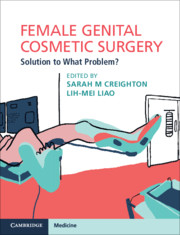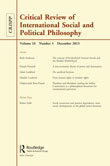beauty
-
Medicalised Genital Cutting and the Limits of Choice
 in Female Genital Cosmetic Surgery: Interdisciplinary Analysis and Solution, edited by Sarah Creighton and Lih-Mei Lao (Cambridge University Press, 2019).
in Female Genital Cosmetic Surgery: Interdisciplinary Analysis and Solution, edited by Sarah Creighton and Lih-Mei Lao (Cambridge University Press, 2019).In this chapter I challenge the idea that an appeal to choice exonerates Female Genital Cosmetic Surgery (FGCS). My argument proceeds in five stages. First, I consider the normative role that choice plays in liberal society and philosophy. Second, I note that UK law does not treat choice as adequate for accessing FGCS. Third, I consider the relationship between choice and the concept of normality. Fourth, I consider choice in the context of cosmetic surgery generally, and analyse the distinctive features of FGCS. Fifth, I consider the policy implications of my analysis.
You can find the book here.
-
Ideology and Normativity
 This paper investigates the possibility of what Sally Haslanger calls ‘ideology critique’. It argues that ideology critique cannot rely on epistemological considerations alone but must be based on a normative political theory. Since ideological oppression is denied by those who suffer from it is it is not possible to identify privileged epistemological standpoints in advance.
This paper investigates the possibility of what Sally Haslanger calls ‘ideology critique’. It argues that ideology critique cannot rely on epistemological considerations alone but must be based on a normative political theory. Since ideological oppression is denied by those who suffer from it is it is not possible to identify privileged epistemological standpoints in advance.You can read the paper here and on the OUP Philosophy Festival Reading List here.
-
Are breast implants better than female genital mutilation? Autonomy, gender equality and Nussbaum’s political liberalism
 Critical Review of International Social and Political Philosophy (CRISPP) Vol. 7 No. 3 (Autumn 2004).
Critical Review of International Social and Political Philosophy (CRISPP) Vol. 7 No. 3 (Autumn 2004).This paper outlines two forms of autonomy, and argues that political liberals such as Martha Nussbaum wrongly prioritise second-order autonomy. As a result, they cannot provide adequate criticism of unjust social norms. The two cases of breast implants and female genital mutilation are compared to illustrate this point.